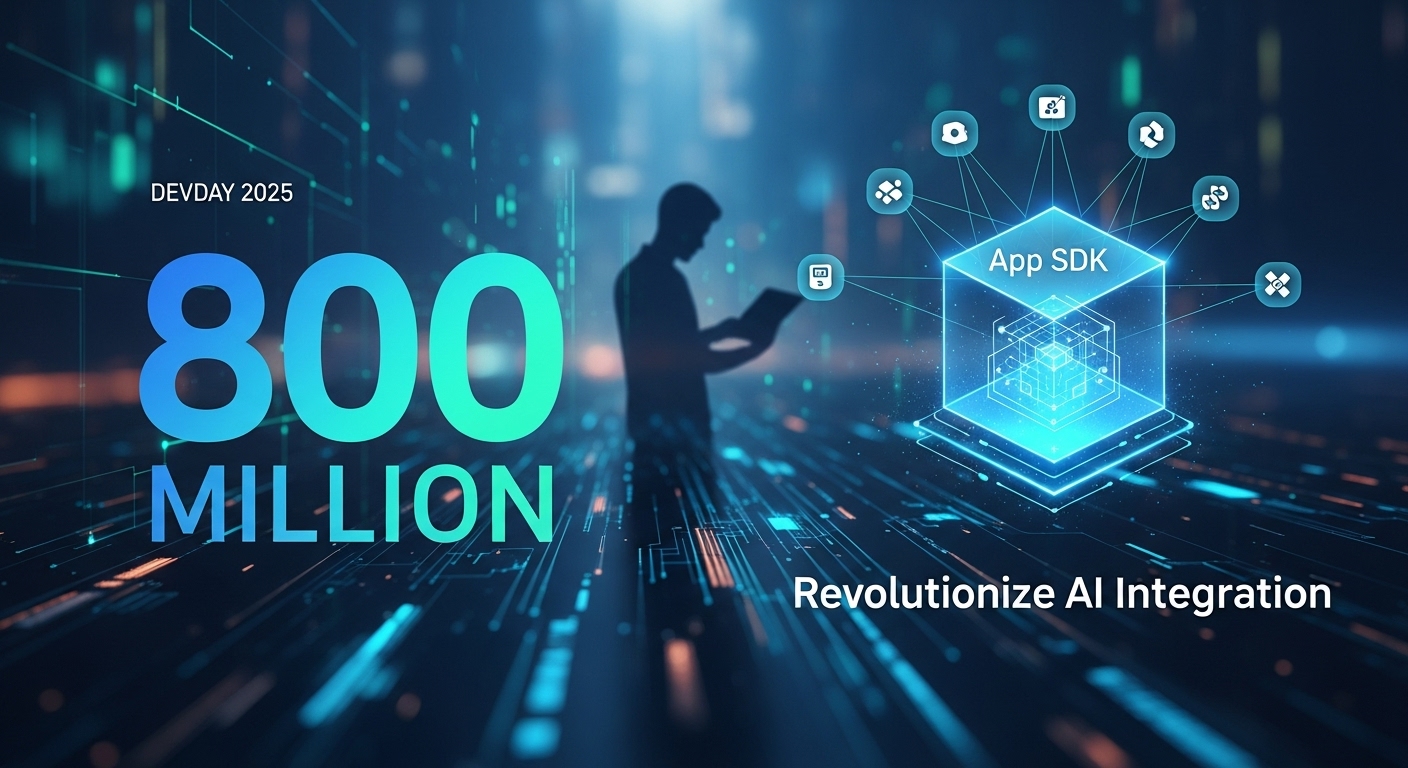衝撃!ChatGPTが8億ユーザー突破!App SDKであなたの日常はAIとシームレスに融合する未来へ
2025年10月6日(現地時間)、サンフランシスコで開催されたOpenAIの年次開発者会議「DevDay 2025」は、AIの未来を再定義する画期的な発表の連続でした。特に注目すべきは、対話型AI「ChatGPT」の週間アクティブユーザー数(WAU)が驚異の8億人を突破したこと、そして「Apps SDK」を通じてChatGPTがあらゆるアプリケーションと統合されるという、AIエコシステムの大規模な変革です。
人類史上最速の普及スピード:8億ユーザー達成の衝撃
OpenAIのサム・アルトマンCEOは、基調講演でChatGPTの週間アクティブユーザー数が8億人を超えたと発表し、会場を沸かせました。これは2023年の1億人からわずか2年間で8倍に急増した数字であり、AI技術が世界中でいかに急速に浸透しているかを明確に示しています。
この驚異的な成長は、個人の生産性向上からビジネスの効率化まで、ChatGPTが幅広い分野で活用されている証拠です。さらに、OpenAIのサービスを利用する開発者の数も200万人から400万人へと倍増し、APIプラットフォームは毎分60億トークン以上を処理していると報告されており、そのエコシステムの活況ぶりがうかがえます。
ChatGPTが“アプリのOS”へ進化:Apps SDKの登場
DevDay 2025で最も革新的な発表の一つが、ChatGPTを「アプリプラットフォーム」へと拡張する「Apps SDK」のプレビュー公開です。 これにより、開発者はChatGPT内で直接ネイティブアプリケーションを構築し、8億人を超えるユーザーに提供できるようになります。
Apps SDKで何が変わるのか?
- シームレスな統合: Apps SDKは、既存のオープンスタンダードである「Model Context Protocol(MCP)」を拡張しており、開発者はアプリのロジックとインターフェースの両方を設計できます。これにより、マップ、プレイリスト、プレゼンテーションなどのインタラクティブな要素が会話に自然に溶け込み、ユーザーはChatGPT内で直接アプリを操作できるようになります。
- 自然言語による操作: ユーザーはアプリ名を指定して利用を開始できるほか、会話の文脈に基づいてChatGPTが関連するアプリを自動的に提案します。たとえば、「Spotify、金曜日のパーティー用のプレイリストを作って」と入力すれば、ChatGPTがSpotifyアプリを起動し、関連する機能を提供するといった体験が可能になります。
- 初期パートナーと未来: Booking.com、Canva、Coursera、Expedia、Figma、Spotify、Zillowなどの大手企業が、すでにApps SDKを利用したアプリのデモを披露しました。 特にFigmaとの統合では、会話から直接ユーザーフローなどの図を自動生成するデモンストレーションが話題となり、アイデア出しからプロトタイプ作成までのプロセスが劇的に短縮される可能性を示しました。 OpenAIは今後、アプリ審査・ディレクトリ公開・マネタイズの詳細も順次共有する方針を示しており、ChatGPTエコシステム内での新たな経済圏の創出が期待されます。
AIが日常の「OS」となる未来
今回のOpenAI DevDay 2025の発表は、ChatGPTが単なるチャットツールから、私たちのデジタルライフを統合する「会話型OS」へと進化を遂げることを明確に示しています。 個別のアプリを開く手間なく、自然言語で指示するだけで複数のサービスが連携して動作する時代が到来しつつあります。
この変化は、ビジネスパーソン、開発者、そして一般ユーザーのすべてに大きな影響を与えるでしょう。企業にとっては、「ChatGPTエコシステムへの統合」が新たな必須要件となり、自社サービスがApps SDKに対応していなければ、ユーザーからの視認性が低下するリスクさえ考えられます。
また、今回のDevDayでは、高精度な推論能力を持つ「GPT-5 Pro」や動画生成AI「Sora 2」、リアルタイム音声対応の「GPT-Realtime Mini」といった新モデルの発表、コード補助AI「Codex」の一般提供開始、AIエージェント開発を簡素化する「AgentKit」なども紹介され、AI技術全体の進化が加速していることを示しました。
ChatGPTの8億ユーザー突破とApps SDKの登場は、AIが「一部の先進企業が試す技術」から「全人類の日常インフラ」へと完全にシフトしたことを物語っています。 私たちは今、AIが私たちの生活、仕事、そして創造性を根底から変革する新たな時代の幕開けに立っています。
ChatGPT Surges Past 800 Million Users: OpenAI DevDay 2025 Unveils a Future of Seamless AI Integration
OpenAI’s DevDay 2025 in San Francisco marked a pivotal moment for artificial intelligence, with CEO Sam Altman announcing that ChatGPT has surpassed a staggering 800 million weekly active users. This monumental achievement underscores the platform’s unprecedented growth and its transformation from a revolutionary chatbot into an indispensable tool for millions globally. The event also unveiled OpenAI’s ambitious vision for an integrated AI ecosystem, primarily driven by the new App SDK, which promises to embed ChatGPT’s intelligence directly into a myriad of applications.
ChatGPT’s Phenomenal Growth: A Testament to AI’s Pervasive Impact
The announcement that ChatGPT now serves over 800 million weekly active users is a clear indicator of AI’s rapid and deep integration into daily life. This figure represents an explosive growth trajectory, having doubled from 400 million users in February 2025 and significantly expanding from 100 million in 2023. This accelerated adoption highlights how individuals and enterprises are increasingly relying on generative AI for everything from enhancing productivity and fostering creativity to streamlining complex workflows across industries. The platform processes over 2 billion queries daily and sees 5.8 billion monthly visits, solidifying its position as a leading generative AI tool.
The App SDK: Ushering in a New Era of Application Integration
Beyond user growth, the spotlight at DevDay 2025 shone brightly on the introduction of the App SDK. This software development kit is set to fundamentally redefine how applications interact with AI. Rather than AI being an add-on feature, OpenAI is pioneering a new paradigm where entire applications can run as interactive components directly within ChatGPT conversations. This strategic move positions ChatGPT not merely as a conversational AI, but as a “super app” or even an “AI operating system,” capable of managing and invoking diverse applications through natural language commands.
The App SDK is built on the open Model Context Protocol (MCP), acting as the connective tissue between ChatGPT and external applications. This provides developers with full control over backend logic and frontend UI, enabling them to build interactive conversational applications that trigger actions and render rich user interfaces directly within the chat interface. Launch partners already demonstrating this capability include major services like Spotify, Canva, Zillow, Figma, Coursera, Expedia, and Booking.com, showcasing the breadth of the platform’s vision.
Implications for Developers and Users
For developers, the App SDK presents unprecedented opportunities. It provides immediate access to ChatGPT’s massive user base, eliminating traditional app store distribution challenges and offering new avenues for monetization. OpenAI also introduced AgentKit, a set of building blocks to simplify the creation and deployment of autonomous AI agents, further empowering developers to innovate at a faster pace. This focus on developer empowerment, as articulated by Sam Altman, aims to make it faster than ever to go from idea to product.
Users, on the other hand, stand to benefit from a more seamless and intuitive digital experience. Imagine searching for a house on Zillow, designing a graphic on Canva, or creating a playlist on Spotify, all without ever leaving the ChatGPT interface, using simple conversational prompts. This level of integration promises to enhance productivity, creativity, and overall user engagement by making AI a central hub for various digital interactions.
The Future of the AI Ecosystem
OpenAI’s announcements at DevDay 2025 clearly indicate a strategic shift towards building a comprehensive AI development platform. By transforming ChatGPT into an application platform and fostering deep integration with third-party services, OpenAI is reshaping the broader AI ecosystem. This vision extends to making AI more accessible and capable, with future plans including advancements in GPT models like GPT-5 Pro, enhanced voice interaction, and more sophisticated content generation through tools like Sora 2 for video. As AI becomes increasingly embedded in our digital lives, OpenAI’s DevDay 2025 signals a future where AI-powered applications are not just features but fundamental components of our daily interactions, driven by a unified and expansive AI-centric operating system.




コメント